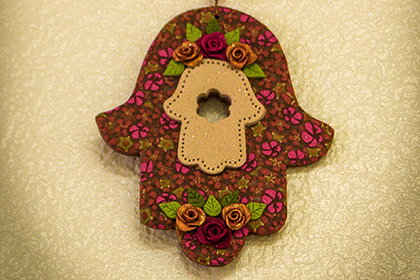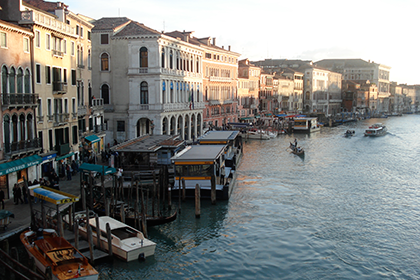On a recent Sunday morning, I venture into Fairway, a grocery store on the Upper West Side of Manhattan, prepared to battle the crowd of strollers, walkers, and yoga mats that stand between my grocery list and me. This week, I am on a particular mission: it’s the week before the Jewish holiday of Passover, meaning that I—like what appears to be the majority of the other customers—need to stock up on the foods that meet the specific dietary restrictions for this eight-day holiday. I imagine this mission to be a reenactment of the actual parting of the Red Sea—the story of the Jews’ escape from slavery in Egypt, which we retell on Passover—since people rush toward the Passover food aisle with the same sense of urgency one would bring if being chased by enemy soldiers and crashing waves.
Finally, I find two people stocking shelves and ask them where I can find the Kosher for Passover yogurts. They speak to each other in rapid Spanish, and they don’t respond to me with directions in English; instead, one leads me to the dairy section and shows me how to find the Hebrew, Kosher for Passover stamp of approval on certain Dannon products. It’s a safe bet that the majority of the people who work at Fairway aren’t observant Jews, but they cater to a demographic of shoppers who are, so they are all well-versed in the laws of Kashrut and the Jewish calendar year. As I walk out of Fairway with shopping bags full of matzah and special yogurts, overhearing groups of people stopping each other on the street to wish each other a “Happy Holiday,” I have one of my only-on-the-Upper-West-Side moments.
Manhattan’s Upper West Side—mainly between W 70th and W 96th Streets—is home to an enclave of observant Jews across the religious spectrum, and with that comes a concentration of synagogues, Kosher restaurants, and challah per capita that I believe could only be rivaled by a city in Israel. The neighborhood is made up largely of families and the elderly, but it also has the reputation of being the “it place” to socialize for Jewish twenty-somethings. It’s a comfortable place to live for young, single New Yorkers who want to mingle with others who observe Shabbat, keep Kosher, and integrate Jewish religious or cultural practices into everyday life. There’s even a version of Craigslist that caters solely to Jews searching for apartments on the Upper West Side.
These idiosyncrasies are, in large part, why I find it easy to call the Upper West Side home, even when my own family isn’t nearby. But, like any family, this community can feel overbearing and judgmental, making it just as easy to feel self-conscious as it is to feel included. When I join the hoards of young people walking from synagogue to a Shabbat dinner on a Friday night, I know that other Sabbath observers who pass by will immediately identify me as part of their community and try to figure out who we know in common, wishing me a “Shabbat Shalom” (“Good Sabbath”) even if we are perfect strangers. On the flip side, if I’m coming home from work late, with my headphones in as I head out of the subway, I don my invisibility cloak, hoping that I don’t run into my religious friends and ruin my chance of being indexed as “datable” for eligible bachelors who are Sabbath observers. Last year, an acquaintance set me up with an old friend of hers who lives on the Upper West Side. I was so paranoid that it would be the topic of every dinner conversation in our social network, that I refused to go out on the Upper West Side all weekend, and I swore my friend to secrecy. Low and behold, before we had even set a location for the date, people came out of the woodwork to text me, telling me they’d heard I was going on a date with this person—and, in many cases, to tell me they’d already dated him. Utterly mortified, I coined the catch phrase, “Can’t a girl have a private life on the Upper West Side?!” I quickly learned the answer to that question.
All of that is to say that the codes and assumptions about lifestyle choices, political opinions, and social circles that filter into the young Upper West Sider’s lexicon can make a welcoming community feel more like an exclusive club, and you need to know the password to be let in. Personally, I navigate the Upper West Side by straddling the “insider” and “outsider” Jewish circles of my neighborhood, sending out the appropriate signals depending on which I feel like joining at a given moment. Like in any club, you feel like more of a participant if you can “talk the talk” and “walk the walk”—literally and figuratively in this case—so rather than describe this diverse Jewish community through sweeping generalizations, I thought I’d provide a beginner’s “phrase book” so that you can come and experience it like a local.
- Summer camp: The best thing that ever happened to you. The place where you met your lifelong friends, learned about prayers and puberty, and probably had your first kiss. When meeting people for the first time, even if it’s been ten years since anyone was even a camp counselor, you will likely be asked where you went to camp, followed by a ten-minute back-and-forth until you find someone you know in common. (If you didn’t go to camp, say you went to “some remote location of Camp Ramah that no one’s ever really heard of.”)
- Meal: This word you know, but in the context of the Upper West Side, it refers either to Friday night dinner or Saturday lunch. Starting Monday morning, friends will text each other to find out where they’re “having their meals” the following weekend. If you are “invited for a meal” (as opposed to “invited for dinner and drinks”), you should ask if you can bring challah or wine. Rather than try to bring something artisanal or fancy, which may not be up to all guests’ standards of kashruth, you should pick up something from a bodega on the Upper West Side. Meals are places to see and be seen. It’s a big deal to secure a place around certain people’s folding tables, and following your meal you will likely walk over to someone else’s meal and schmooze over scotch and their leftovers.
- Shittach: Twenty-four-year-olds on the Upper West Side seem to be more obsessed with marriage than the average New Yorker that age, so it’s a safe bet that you’ll throw in this term often. When we talk about dating and marriage, we use the word “shittach” to mean a blind date. Officially, a shittach is a setup orchestrated by a matchmaker, but, come on, it’s the Upper West Side, not the Fiddler on the Roof’s shtetl! Instead, you might be invited to a meal to orchestrate a shittach; in other words, your friend wants to set you up with her friend from camp, so she invites you both for a Friday night meal, seats you next to each other, and it’s b’sheret (“meant to be”). (And, if it doesn’t work out, just know that you will run into this person and all of his friends for the rest of your life on the Upper West Side.)
- Shomer: When looking for a roommate, you will want to know if that person falls into any/all of these categories: shomer Shabbat; shomer Kashruth; shomer nagiyah. The first refers to whether somebody observes all the laws of the Sabbath, abstaining from use of electricity and spending money. The second term gives you insight into how many sets of dishes that person would contribute (one for milk and one for meat?). The last, used mainly among the more Orthodox circles these days, will allow you to inquire about a person’s—ahem—sexual experiences. If your friend wants to set you up on a shittach, you’d best first confirm whether or not he’s shomer to find out if he touches girls before marriage.
- Jake’s Dilemma: Watch out! This phrase in no way allludes to the biblical story in which Jacob wrestles with an angel. (Actually, now that I mention it, maybe it does?) In this context, it simply refers to the most crowded bar on a Saturday night. If you want to go out in the West 80s, start at Jake’s Dilemma, show your ID to the bouncer, and throw in some of your new catch phrases. You’ll feel like a local. And, who knows, you might just meet your long-lost friend from camp or your b’sheret.

Photo by Gali Levi-McClure
